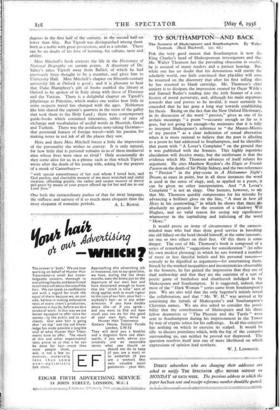TO - SOUTHAMPTON—AND - BACK - The Sonnets of Shakespeare and Southampton. By Walter
Thomson. (Basil Blackwell. 12s. 6d.) FOR the -very good reason that Southampton is now the King Charles's head of Shakespearean investigators and that Mr. Walter Thomson_ has the prevailing obsession in exceliis, , he is assured of many readers and a patient hearing. But, while one has no doubt that his detonations will startle the scholarly world, one feels convinced that placidity will soon be resumed on the discovery that after his first telling shot he has resorted to blank cartridge. Mr. Thomson's chief anxiety is to dissipate the impression created by Oscar Wilde's and Samuel Butler's reading into the 20th Sonnet of a con- fession of moral perversity, and, although his main arguinent towards that end proves to be invalid, it must certainly be conceded that he has gone a long way towards establishing his thesis. Basing on the fact that the New Oxford Dictionary, in its discussion of the word "passion," gives as one of its archaic meanings "a poem "—accurate enough so far as it goes, but not going far enough—he maintains that it is folly to interpret Shakespeare's reference to "the Master-Mistris of my passion" as a clear indication of sexual aberration when it is more rational to believe that the poet is alluding to a poem he had addressed to Southampton, and he identifies that poem with "A Lover's Complaint" on the ground that it was published with the Sonnets. This highly ingenidus elucidation will deceive many, but the misfortune is that the evidence which Mr. Thomson advances of itself refutes his argument. He cites Matthew Roydon's An Elegie or Friends Passion on the death of Sir Philip Sidney, and the two references to " Passion " in the play-scene in A Midsummer Night's Dream, as cases in point, but in all these instances the word is used in the sense of elegy, and, as applied to a poem, it can be given no other interpretation. And "A Lover's Complaint" is not an elegy. One hastens, however, to say that Mr. Thomson quickly compensates for his mistake by advancing a -brilliant gloss on the line, "A man in hew All Hews in his controwling,'" an which he shows that thtre,14se absolutely no grounds for the creation of a shadowy Will Hughes, and no valid reason for seeing any significance whatsoever in the Capitalising and italicising of the word " Hews."
It would prove an irony of circumstance if the earnest- minded man who had thus done good service in knocking one old fallacy on the head should himself, at the same, juncture, set one or two others on their feet. Of this there is some danger. The rest of Mr. Thomson's book is composed of a series of remarkable "suggestions for consideration' (to-echo his own modest phrasing) in which he sets forward a number of more or less fanciful beliefs and his personal reasons— scarcely to be dignified as arguments—for entertaining them. Struck by the marked inequalities and inconsistencies observable in the Sonnets, he has gained the impression that they are of dual authorship and that they are the outcome of a sort of poetic game of battledore and shuttlecock indulged in by Shakespeare and Southampton. It is suggested, indeed, that most of the "Dark Woman" series came from Southampton's pen. We are also told that the only begetter's initials reveal the collaboration, and that "Mr. W. H." was arrived at by conjoining the initials of Shakespeare's and 'Southampton's Christian names. We are also asked to consider the possi- bility that the contributions of Shakespeare and his three fellow dramatists to "The Phoenix and the Turtle" were sent to Southampton during his imprisonment in the Tower by way of cryptic solace for his sufferings. In all this criticism has nothing on which to exercise its scalpel. It would be idle to dismiss postulates which, with the fog of the centuries surrounding us, can neither be proved, nor disproved. The question resolves itself into one of mere likelihood on which expressions of opinion lead nowhere.
W. J. LAWRENCE.


































































 Previous page
Previous page